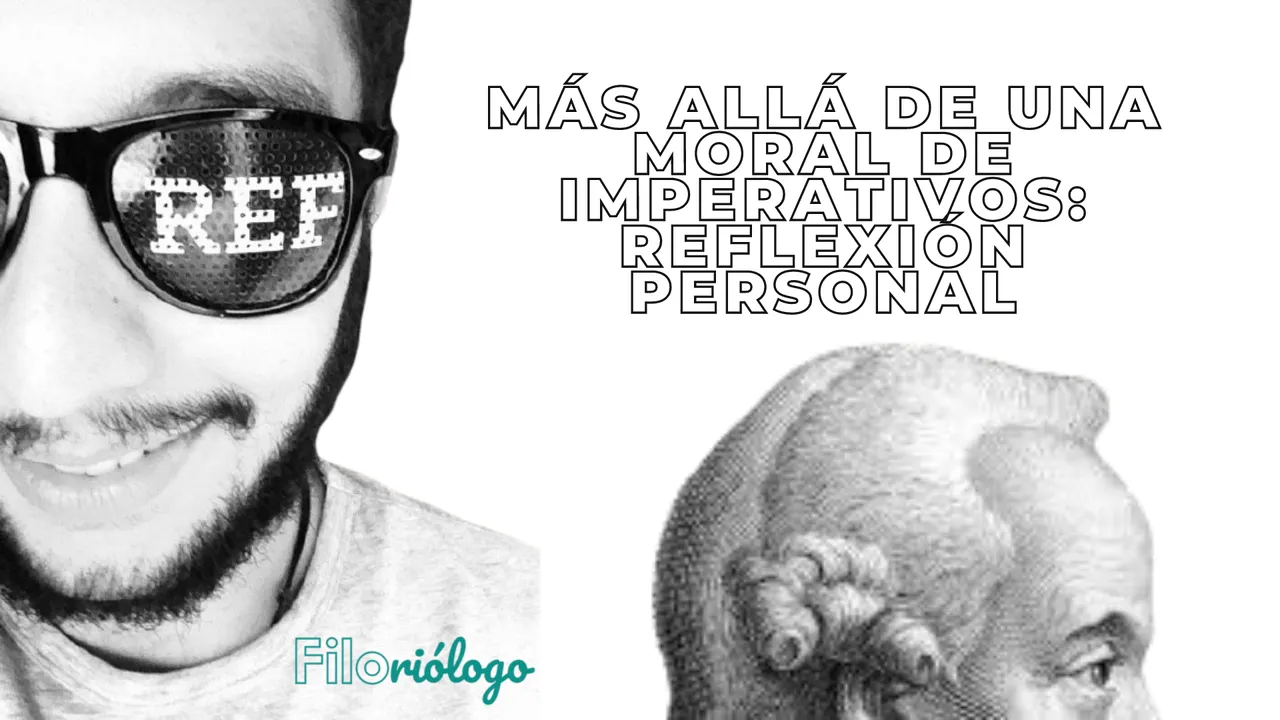Versión en Español
Hola Hivers
Bienvenidos a mi Blog
Hoy quiero invitarlos a disertar conmigo sobre un aspecto de la moral, los imperativos. ¿Qué es un imperativo? ¿Cómo definen la moral? Características de una moral basada en imperativos, podemos ir más allá de una moral a base de imperativos.

Desde que leí al filósofo prusiano Inmanuel Kant en sentido moral quedé prendado de sus ideas y reflexiones. En sentido moral Kant resume su pensamiento en una idea, lo que conocemos como “Imperativo Categórico” pero sería muy fácil iniciar nuestro ejercicio reflexivo partir del imperativo categórico a secas, así que vamos a dar un par de pasos atrás.
En el año 1788 Kant publica su famoso texto la “Crítica de la razón práctica” y en ella intenta fundar una ética racional y autónoma, que tenga como único apoyo la razón. Lo que sucede con la reflexión Kantiana que tanto me llaman la atención es que llega a la conclusión de que la ética esta basada en imperativos, en órdenes.
“Hay que hacer esto, aquello.” Kant, los llama Imperativos hipotéticos, imperativos condicionados, es decir, hago algo para obtener otra cosa. Si lo pensamos en función personal, podemos recordar aspectos de nuestra crianza cuando nuestros padres nos daban ordenes tipo: “Si obtienes buenas calificaciones, recibes un premio a final del año escolar.”

Kant se da cuenta de los aspectos positivos o favorables de los imperativos, pero se percata de las deficiencias más grandes de los imperativos hipotéticos. Pero ahora la pregunta, es:
¿Cómo saber en cada caso lo que debo hacer?
Esta es la pregunta del millón, porque una ética basada en imperativos hipotéticos, o imperativos parciales como me gusta llamarlo a mí, no responde a esta cuestión de una moral universal. De modo que la razón debe ayudar a construir un imperativo universal.
Y Kant llega a la conclusión de que debe existir un “Imperativo Categórico” o como también podemos llamarlo un Imperativo Universal. Pero:
¿Qué es eso de un Imperativo Universal?
Básicamente podríamos resumirlo diciendo;
“Haz aquello que sea digno de convertirse en ley universal”
Ahora bien, ¿cómo traducimos esto a un lenguaje cotidiano?
Planteemos un caso hipotético…

Si voy a hablar con alguien digo la verdad y puedo desear que todos lo seres humanos digan siempre la verdad. De hecho, popularmente se dice: “No hagas a los demás lo que no te gustaría que hicieran contigo.” Si no quieres que te mientan, entonces no debes mentir.
Kant nos propone una moral regida por la razón, y por la buena voluntad, ya que frente a cada situación debemos pensar que nuestras decisiones deben ser dignas de convertirse en una ley para todos. Seria preguntarnos cada instante frente a dilemas éticos y morales, ¿Qué decisión debo tomar que pueda convertirse en una ley para todos?
Ahora bien, como ir más allá de un moral basada en un “Imperativo Categórico” creo que una de las vías que podemos pensar, es intentar construir y edificar nuevas leyes, porque tantos los imperativos hipotéticos como el “Imperativo Categórico” están basados de manera a priori en ciertos valores universales como los mandamientos, por ejemplo. Culturalmente de manera innata heredamos preceptos morales como “No matar”. Creo que la construcción en negativo ya nos enfrenta a un dilema interesante.

Y si planteamos la cuestión del matar en positivo, “Siempre ayudar”. Si nos planteamos la ayuda como una herramienta de bienestar para todos, no consideraríamos herir a otros, mucho menos matar. Creo que edificar nuevas normas o leyes sociales, cuestionar lo que damos por preestablecido puede aventurarnos a ir más allá de una moral basadas en imperativos.
Y ¿tú que piensas? Podríamos construir algo más efectivo que el imperativo en sentido moral. Siento que, aunque Kant nos planteó sus ideas en el siglo XVIII, aun se conserva vigente o por lo menos en ciertos rasgos.
Aun hay padres que basan su crianza en imperativos hipotéticos, no estoy diciendo que esté mal. Pero a nivel social, si nos replanteamos una nueva visión ética podríamos dar pasos interesantes en sentido ético, o quizás me equivoque y de hacerlo cometeríamos grandes errores... Pero no lo sabremos hasta intentarlo.
Gracias por leer.
Si deseas compartir alguna idea, sería fantástico que lo dejas acá abajo en los comentarios.

English Version
Hello Hivers
Welcome to my Blog
Today I want to invite you to discuss with me one aspect of morality, imperatives. What is an imperative? How do you define morality? Characteristics of a morality based on imperatives, we can go beyond a morality based on imperatives.

Ever since I read the Prussian philosopher Immanuel Kant in the moral sense, I have been fascinated by his ideas and reflections. In the moral sense Kant summarizes his thought in one idea, what we know as the "Categorical Imperative", but it would be very easy to start our reflective exercise from the categorical imperative alone, so let's take a couple of steps back.
In 1788 Kant published his famous text "Critique of Practical Reason" and in it he tries to found a rational and autonomous ethics, whose only support is reason. What happens with the Kantian reflection that so much calls my attention is that he comes to the conclusion that ethics is based on imperatives, on orders.
"One must do this, that." Kant calls them hypothetical imperatives, conditional imperatives, that is, I do something to obtain something else. If we think about it in personal function, we can remember aspects of our upbringing when our parents gave us orders like, "If you get good grades, you get a prize at the end of the school year."

Kant realizes the positive or favorable aspects of imperatives, but he notices the larger shortcomings of hypothetical imperatives. But now the question, is:
How do I know in each case what I ought to do?
This is the million-dollar question, because an ethics based on hypothetical imperatives, or partial imperatives as I like to call them, does not answer this question of a universal morality. So reason must help to construct a universal imperative.
And Kant comes to the conclusion that there must be a "Categorical Imperative" or as we can also call it a Universal Imperative. But:
What is that of a Universal Imperative?
Basically we could summarize it by saying;
"Do that which is worthy of becoming a universal law."
Now, how do we translate this into everyday language?
Let's pose a hypothetical case...

If I am going to talk to someone I tell the truth and I can wish that all human beings always tell the truth. In fact, it is popularly said, "Don't do to others what you wouldn't want them to do to you." If you do not want to be lied to, then you should not lie.
Kant proposes a morality governed by reason, and by good will, since in every situation we must think that our decisions must be worthy of becoming a law for all. It would be to ask ourselves every moment when faced with ethical and moral dilemmas, what decision should I make that can become a law for all?
Now, how to go beyond a morality based on a "Categorical Imperative", I believe that one of the ways we can think of is to try to build and construct new laws, because both the hypothetical imperatives and the "Categorical Imperative" are based a priori on certain universal values such as the commandments, for example. Culturally we innately inherit moral precepts such as "Do not kill". I think the negative construction already confronts us with an interesting dilemma.

And if we pose the question of killing in the positive, "Always help". If we approach helping as a tool for the welfare of all, we would not consider hurting others, much less killing. I believe that building new social norms or laws, questioning what we take for pre-established can venture us to go beyond a morality based on imperatives.
And what do you think? We could build something more effective than the imperative in the moral sense. I feel that, although Kant presented his ideas to us in the 18th century, they are still valid or at least in certain features.
There are still parents who base their upbringing on hypothetical imperatives, I am not saying that it is wrong. But at a social level, if we rethink a new ethical vision, we could take interesting steps in an ethical sense, or maybe I am wrong and if we do so we would make big mistakes... But we won't know until we try.
Thanks for reading.
If you want to share any ideas, it would be great if you leave them down here in the comments.

The images were edited by me in an app called PicsArt:
Here I leave the sources of the images



